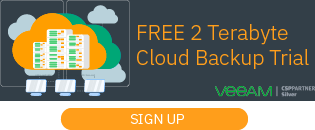Burn The Tapes! How Data Backup Is Changing
Views, News & more

The way we backup our data is changing. We’ve been through the floppy disk stage (too big, yet not big enough…) and through the flashdrive stage (useful but limited and not secure) and we are now emerging into a new era. There’s a huge number of options out there and IT managers who are well informed about backing-up their data can become the heroes of their organisations.
Just imagine the moment when you able to say ‘no, don’t worry - the data’s all safe…’ to your CEO. Priceless.
Disks, not tapes
Tapes have been used for many years in the archiving of large volumes of data, but no more. Disks have become the norm and businesses now routinely backup data to disks, which are a much cheaper and faster alternative. It is also far easier to restore data saved on disks.
Granular data storage
It’s obviously far more convenient to save data in a granular way so that the exact data you need can be extracted easily. Backup used to involved storing everything, which was fine, but in practice we often need to restore smaller pieces of data, such as individual VMs, emails, files or folders. To enable us to do this, a good IT manager will apply different backup policies to these different types of data.
De-duplication
This is the practice of ensuring no data is stored more than once. For example, every single one of your emails may carry your signature information, but this really doesn’t need to be stored. De-duplication is now a routine practice that saves enormous amounts of storage space and, again, makes data recovery quicker and simpler.
Encryption
Since the introduction of GDPR, encryption has become an even more vital part of most IT managers’ data backup processes. IT managers are aware that encryption of backed-up data is essential due to the growing responsibility on their shoulders. If there is a data breach, GDPR requires that customers are informed and if their data is encrypted, there is potentially less of a problem.
Application specific backup
These tools specialise in back up a just a few or even just one application. Using this technology reduces the likelihood of data loss and improves the chances of complete and rapid recovery.
Platform Agnostics
The growth in Linux as a server OS means that back-up systems now need to be able to support more than just the Windows server.
Network-based backup
Backup solutions no longer need to be connected to the server being backed-up. Increasingly, backup is being performed over the network as a result of increasing LAN bandwidths and the growth of cloud hosting.
Online backup
This is perhaps the biggest change to backup in recent years. Backing up your data to the cloud has become the norm. Data no longer has to be physically saved to tapes or even disks that are then taken off-site. Cloud storage improves data security and with the price of leased lines falling all the time, businesses are finding it increasingly viable to backup data to the cloud, which takes us to our next point...
Automation
Backing up data online means it is usually done without any intervention from staff. The back-up is automated. The benefits of automated backup are really evident when staff are unavailable due to holidays or sickness.
Continuous Data Protection
CDP is still pretty pricey, thus not a viable option for a large number of businesses, but that is likely to change. The benefits of almost continuous data backup, as opposed to the traditional once-per-day backup are easy to see. And this option is becoming increasingly available as we shift to disk and network-based backup.
So, which backup service is right for you?
With much enhanced backup solutions available, it’s sometimes challenging to decide which solution is right for your business. A recent Tech Target survey saw Veeam coming out on top for both the Enterprise and mid-sized market.
Note: This backup service is for organisations, not for consumers or sole traders.
Get in touch
020 7847 4510
We may process your personal information in order to send you information you request, measure and improve our marketing campaigns, and further our legitimate interests. For further details, see our privacy policy.
Contact us
-
- Head Office:
- hSo, 50 Leman Street, London, E1 8HQ
- Switchboard:
- 020 7847 4500
- Support (24x7):
- 0333 200 3337
- support@hso.co.uk
- Marketing & Sales:
- 020 7847 4510
- info@hso.co.uk


















